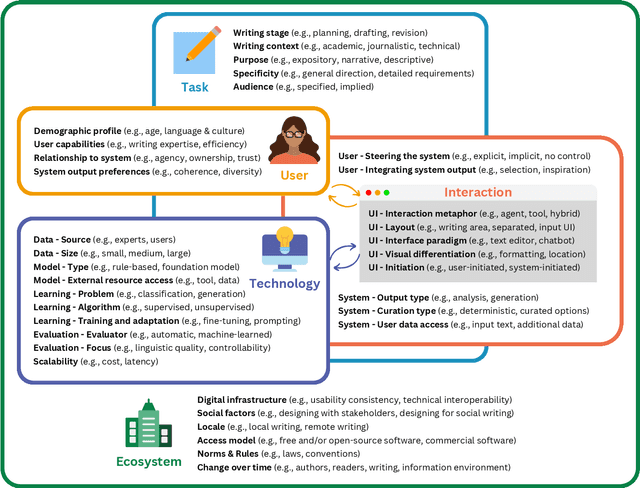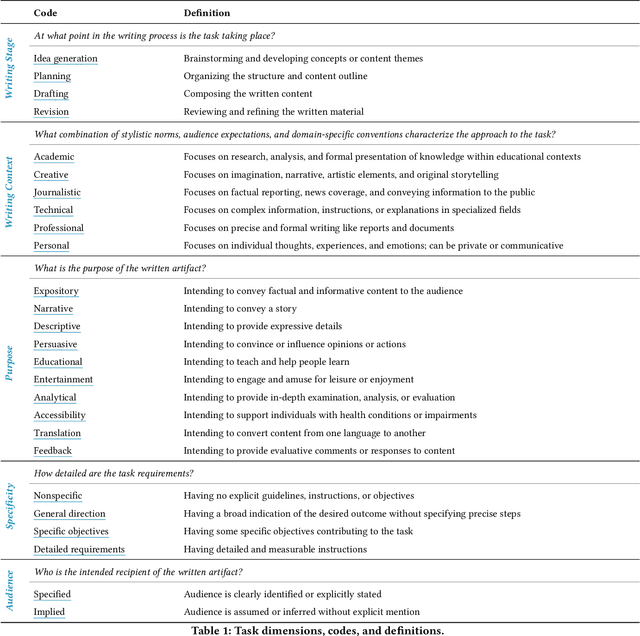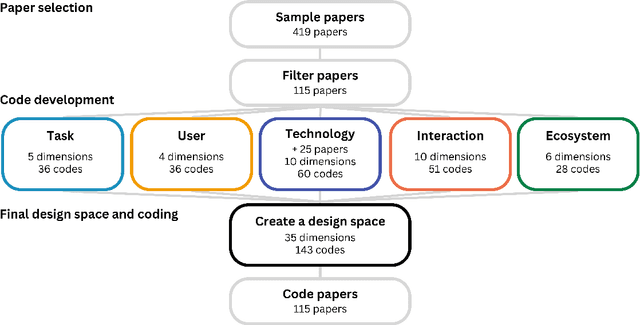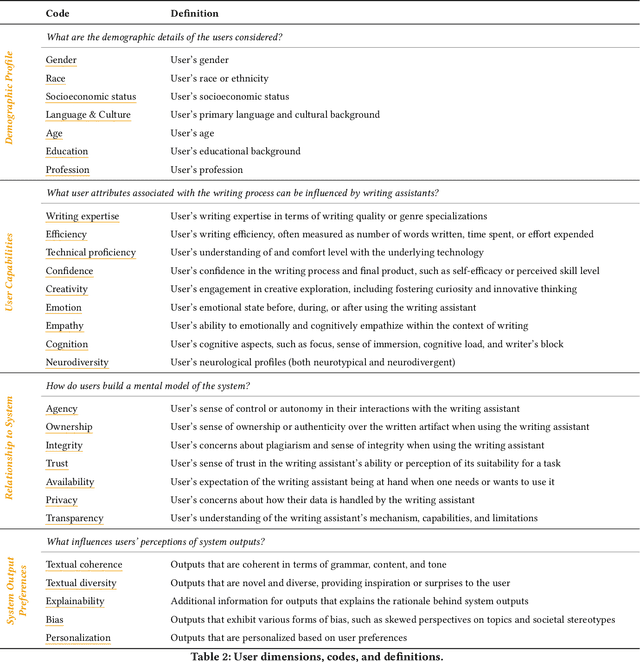Tal August
SocialVeil: Probing Social Intelligence of Language Agents under Communication Barriers
Feb 04, 2026Abstract:Large language models (LLMs) are increasingly evaluated in interactive environments to test their social intelligence. However, existing benchmarks often assume idealized communication between agents, limiting our ability to diagnose whether LLMs can maintain and repair interactions in more realistic, imperfect settings. To close this gap, we present \textsc{SocialVeil}, a social learning environment that can simulate social interaction under cognitive-difference-induced communication barriers. Grounded in a systematic literature review of communication challenges in human interaction, \textsc{SocialVeil} introduces three representative types of such disruption, \emph{semantic vagueness}, \emph{sociocultural mismatch}, and \emph{emotional interference}. We also introduce two barrier-aware evaluation metrics, \emph{unresolved confusion} and \emph{mutual understanding}, to evaluate interaction quality under impaired communication. Experiments across 720 scenarios and four frontier LLMs show that barriers consistently impair performance, with mutual understanding reduced by over 45\% on average, and confusion elevated by nearly 50\%. Human evaluations validate the fidelity of these simulated barriers (ICC$\approx$0.78, Pearson r$\approx$0.80). We further demonstrate that adaptation strategies (Repair Instruction and Interactive learning) only have a modest effect far from barrier-free performance. This work takes a step toward bringing social interaction environments closer to real-world communication, opening opportunities for exploring the social intelligence of LLM agents.
Learning User Preferences Through Interaction for Long-Term Collaboration
Jan 06, 2026Abstract:As conversational agents accumulate experience collaborating with users, adapting to user preferences is essential for fostering long-term relationships and improving collaboration quality over time. We introduce MultiSessionCollab, a benchmark that evaluates how well agents can learn user preferences and leverage them to improve collaboration quality throughout multiple sessions. To develop agents that succeed in this setting, we present long-term collaborative agents equipped with a memory that persists and refines user preference as interaction experience accumulates. Moreover, we demonstrate that learning signals can be derived from user simulator behavior in MultiSessionCollab to train agents to generate more comprehensive reflections and update their memory more effectively. Extensive experiments show that equipping agents with memory improves long-term collaboration, yielding higher task success rates, more efficient interactions, and reduced user effort. Finally, we conduct a human user study that demonstrates that memory helps improve user experience in real-world settings.
Designing Beyond Language: Sociotechnical Barriers in AI Health Technologies for Limited English Proficiency
Nov 10, 2025



Abstract:Limited English proficiency (LEP) patients in the U.S. face systemic barriers to healthcare beyond language and interpreter access, encompassing procedural and institutional constraints. AI advances may support communication and care through on-demand translation and visit preparation, but also risk exacerbating existing inequalities. We conducted storyboard-driven interviews with 14 patient navigators to explore how AI could shape care experiences for Spanish-speaking LEP individuals. We identified tensions around linguistic and cultural misunderstandings, privacy concerns, and opportunities and risks for AI to augment care workflows. Participants highlighted structural factors that can undermine trust in AI systems, including sensitive information disclosure, unstable technology access, and low digital literacy. While AI tools can potentially alleviate social barriers and institutional constraints, there are risks of misinformation and uprooting human camaraderie. Our findings contribute design considerations for AI that support LEP patients and care teams via rapport-building, education, and language support, and minimizing disruptions to existing practices.
Personalized Real-time Jargon Support for Online Meetings
Aug 13, 2025



Abstract:Effective interdisciplinary communication is frequently hindered by domain-specific jargon. To explore the jargon barriers in-depth, we conducted a formative diary study with 16 professionals, revealing critical limitations in current jargon-management strategies during workplace meetings. Based on these insights, we designed ParseJargon, an interactive LLM-powered system providing real-time personalized jargon identification and explanations tailored to users' individual backgrounds. A controlled experiment comparing ParseJargon against baseline (no support) and general-purpose (non-personalized) conditions demonstrated that personalized jargon support significantly enhanced participants' comprehension, engagement, and appreciation of colleagues' work, whereas general-purpose support negatively affected engagement. A follow-up field study validated ParseJargon's usability and practical value in real-time meetings, highlighting both opportunities and limitations for real-world deployment. Our findings contribute insights into designing personalized jargon support tools, with implications for broader interdisciplinary and educational applications.
Uncertainty in Action: Confidence Elicitation in Embodied Agents
Mar 13, 2025Abstract:Expressing confidence is challenging for embodied agents navigating dynamic multimodal environments, where uncertainty arises from both perception and decision-making processes. We present the first work investigating embodied confidence elicitation in open-ended multimodal environments. We introduce Elicitation Policies, which structure confidence assessment across inductive, deductive, and abductive reasoning, along with Execution Policies, which enhance confidence calibration through scenario reinterpretation, action sampling, and hypothetical reasoning. Evaluating agents in calibration and failure prediction tasks within the Minecraft environment, we show that structured reasoning approaches, such as Chain-of-Thoughts, improve confidence calibration. However, our findings also reveal persistent challenges in distinguishing uncertainty, particularly under abductive settings, underscoring the need for more sophisticated embodied confidence elicitation methods.
Automatic Detection of Research Values from Scientific Abstracts Across Computer Science Subfields
Feb 26, 2025Abstract:The field of Computer science (CS) has rapidly evolved over the past few decades, providing computational tools and methodologies to various fields and forming new interdisciplinary communities. This growth in CS has significantly impacted institutional practices and relevant research communities. Therefore, it is crucial to explore what specific research values, known as basic and fundamental beliefs that guide or motivate research attitudes or actions, CS-related research communities promote. Prior research has manually analyzed research values from a small sample of machine learning papers. No prior work has studied the automatic detection of research values in CS from large-scale scientific texts across different research subfields. This paper introduces a detailed annotation scheme featuring ten research values that guide CS-related research. Based on the scheme, we build value classifiers to scale up the analysis and present a systematic study over 226,600 paper abstracts from 32 CS-related subfields and 86 popular publishing venues over ten years.
Tree-of-Debate: Multi-Persona Debate Trees Elicit Critical Thinking for Scientific Comparative Analysis
Feb 20, 2025Abstract:With the exponential growth of research facilitated by modern technology and improved accessibility, scientific discoveries have become increasingly fragmented within and across fields. This makes it challenging to assess the significance, novelty, incremental findings, and equivalent ideas between related works, particularly those from different research communities. Large language models (LLMs) have recently demonstrated strong quantitative and qualitative reasoning abilities, and multi-agent LLM debates have shown promise in handling complex reasoning tasks by exploring diverse perspectives and reasoning paths. Inspired by this, we introduce Tree-of-Debate (ToD), a framework which converts scientific papers into LLM personas that debate their respective novelties. To emphasize structured, critical reasoning rather than focusing solely on outcomes, ToD dynamically constructs a debate tree, enabling fine-grained analysis of independent novelty arguments within scholarly articles. Through experiments on scientific literature across various domains, evaluated by expert researchers, we demonstrate that ToD generates informative arguments, effectively contrasts papers, and supports researchers in their literature review.
Cocoa: Co-Planning and Co-Execution with AI Agents
Dec 14, 2024



Abstract:We present Cocoa, a system that implements a novel interaction design pattern -- interactive plans -- for users to collaborate with an AI agent on complex, multi-step tasks in a document editor. Cocoa harmonizes human and AI efforts and enables flexible delegation of agency through two actions: Co-planning (where users collaboratively compose a plan of action with the agent) and Co-execution (where users collaboratively execute plan steps with the agent). Using scientific research as a sample domain, we motivate the design of Cocoa through a formative study with 9 researchers while also drawing inspiration from the design of computational notebooks. We evaluate Cocoa through a user study with 16 researchers and find that when compared to a strong chat baseline, Cocoa improved agent steerability without sacrificing ease of use. A deeper investigation of the general utility of both systems uncovered insights into usage contexts where interactive plans may be more appropriate than chat, and vice versa. Our work surfaces numerous practical implications and paves new paths for interactive interfaces that foster more effective collaboration between humans and agentic AI systems.
Evaluating Language Model Math Reasoning via Grounding in Educational Curricula
Aug 08, 2024



Abstract:Our work presents a novel angle for evaluating language models' (LMs) mathematical abilities, by investigating whether they can discern skills and concepts enabled by math content. We contribute two datasets: one consisting of 385 fine-grained descriptions of K-12 math skills and concepts, or standards, from Achieve the Core (ATC), and another of 9.9K problems labeled with these standards (MathFish). Working with experienced teachers, we find that LMs struggle to tag and verify standards linked to problems, and instead predict labels that are close to ground truth, but differ in subtle ways. We also show that LMs often generate problems that do not fully align with standards described in prompts. Finally, we categorize problems in GSM8k using math standards, allowing us to better understand why some problems are more difficult to solve for models than others.
A Design Space for Intelligent and Interactive Writing Assistants
Mar 26, 2024



Abstract:In our era of rapid technological advancement, the research landscape for writing assistants has become increasingly fragmented across various research communities. We seek to address this challenge by proposing a design space as a structured way to examine and explore the multidimensional space of intelligent and interactive writing assistants. Through a large community collaboration, we explore five aspects of writing assistants: task, user, technology, interaction, and ecosystem. Within each aspect, we define dimensions (i.e., fundamental components of an aspect) and codes (i.e., potential options for each dimension) by systematically reviewing 115 papers. Our design space aims to offer researchers and designers a practical tool to navigate, comprehend, and compare the various possibilities of writing assistants, and aid in the envisioning and design of new writing assistants.
 Add to Chrome
Add to Chrome Add to Firefox
Add to Firefox Add to Edge
Add to Edge